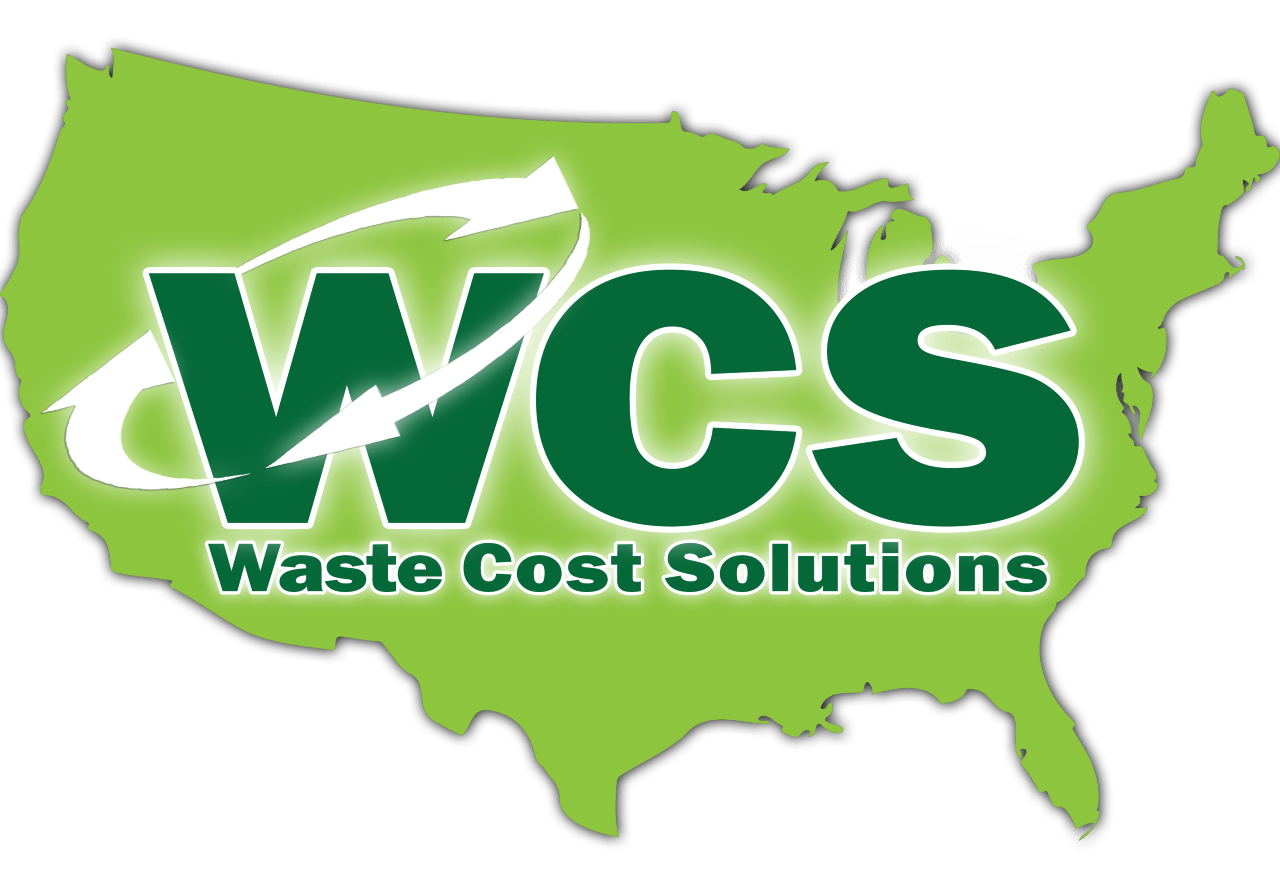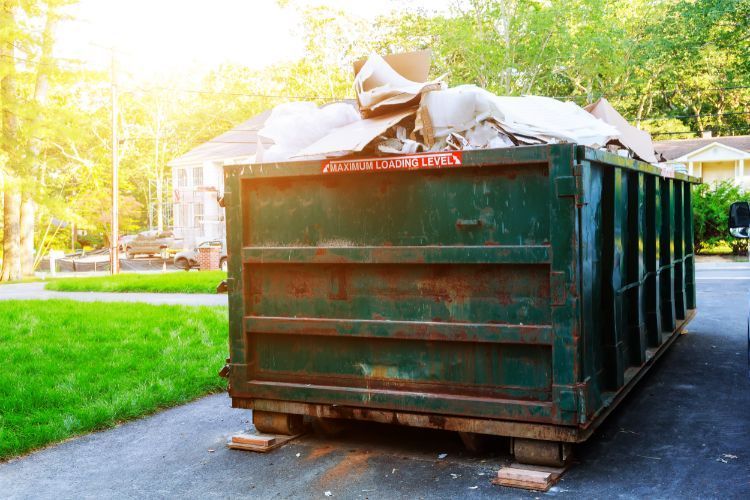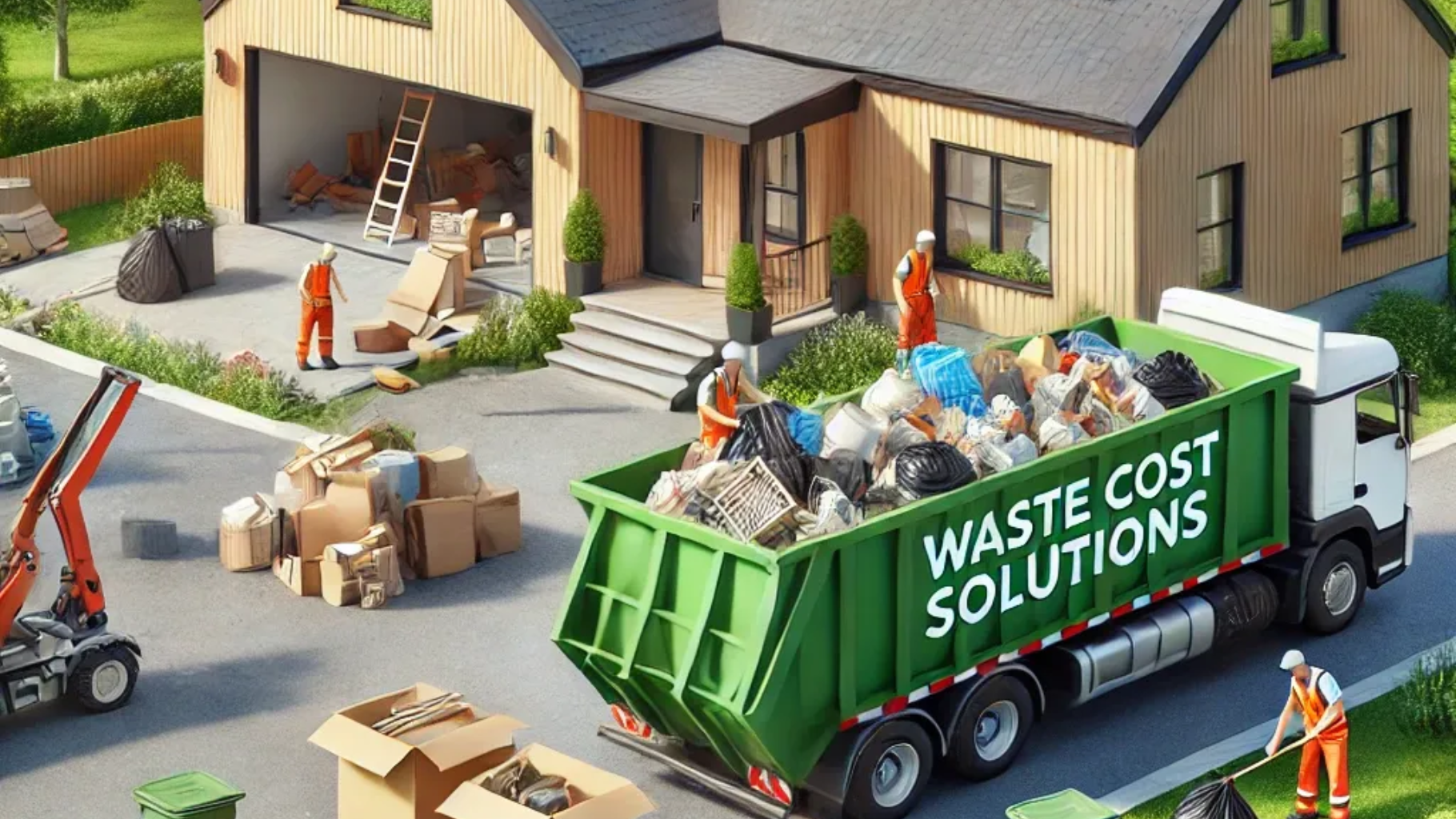
By Tim Cavanaugh
•
September 30, 2025
As the cooler temperatures roll in and the leaves begin to fall, now is the perfect time to tackle one of the most neglected spaces in your home: the garage. If yours has become a cluttered catch-all for tools, boxes, old furniture, broken appliances, or holiday decorations, you're not alone. A fall garage cleanout can be incredibly satisfying—but it can also be overwhelming. That’s where a dumpster rental comes in. Whether you're doing a full purge or just reorganizing, here’s why renting a dumpster this fall is the smart (and stress-free) way to get the job done. 🍁 1. Fall Is the Ideal Time to Declutter Fall gives you that sweet spot of comfortable weather—not too hot, not too cold—which is perfect for hauling items in and out of your garage. Plus, with the holidays approaching, it’s a great time to clear out space before guests arrive or decorations come down from storage. 🗑 2. You’ll Have One Place for Everything You’re Tossing Sorting through a garage often means dealing with a mix of junk—broken tools, damaged furniture, cardboard boxes, yard waste, old paint cans, and who-knows-what else. A dumpster lets you throw it all in one place, saving time and eliminating the need for multiple trash bags or trips to the dump. 🚗 3. Reclaim Your Parking Space Before Winter One of the best motivations for cleaning out your garage in the fall? Snow is coming. Don’t get stuck scraping ice off your windshield in January because your garage is too full to park in. A dumpster rental makes it easier to toss bulky items fast and finally make space for your vehicle. 🧹 4. Safer, Cleaner, and More Organized Cluttered garages aren't just an eyesore—they’re a safety hazard. Tripping over boxes or navigating through piles can lead to accidents, especially if tools or chemicals are involved. Cleaning it out with the help of a dumpster means a cleaner, safer space for your family. ⏳ 5. Save Time and Energy Without a dumpster, you'd be sorting trash into piles, bagging everything, and taking load after load to the landfill or recycling center. That’s hours of extra work. With a dumpster parked in your driveway, just toss as you go—then let the rental company handle the rest. ♻️ 6. Great for Donations and Recycling Too Not everything in your garage needs to be trashed—some items may be perfect for donation or recycling. As you sort, you can easily separate salvageable items, while tossing damaged or unusable ones into the dumpster. It streamlines the entire process. 📦 7. Set Yourself Up for an Easier Spring A fall garage cleanout means you start the new year with a clean slate. When spring arrives, you won’t be greeted by a cluttered mess—you’ll already be organized and ready for whatever projects come next. Ready to Clean Out Your Garage This Fall? If you're planning a garage cleanout, a dumpster rental is your best friend. It simplifies the process, saves time, and helps you get rid of everything in one go. Plus, most rental companies offer flexible drop-off and pickup options, so you can work at your own pace. Don't wait until the snow flies—schedule your dumpster rental today and enjoy a cleaner, safer, and more organized garage this fall.
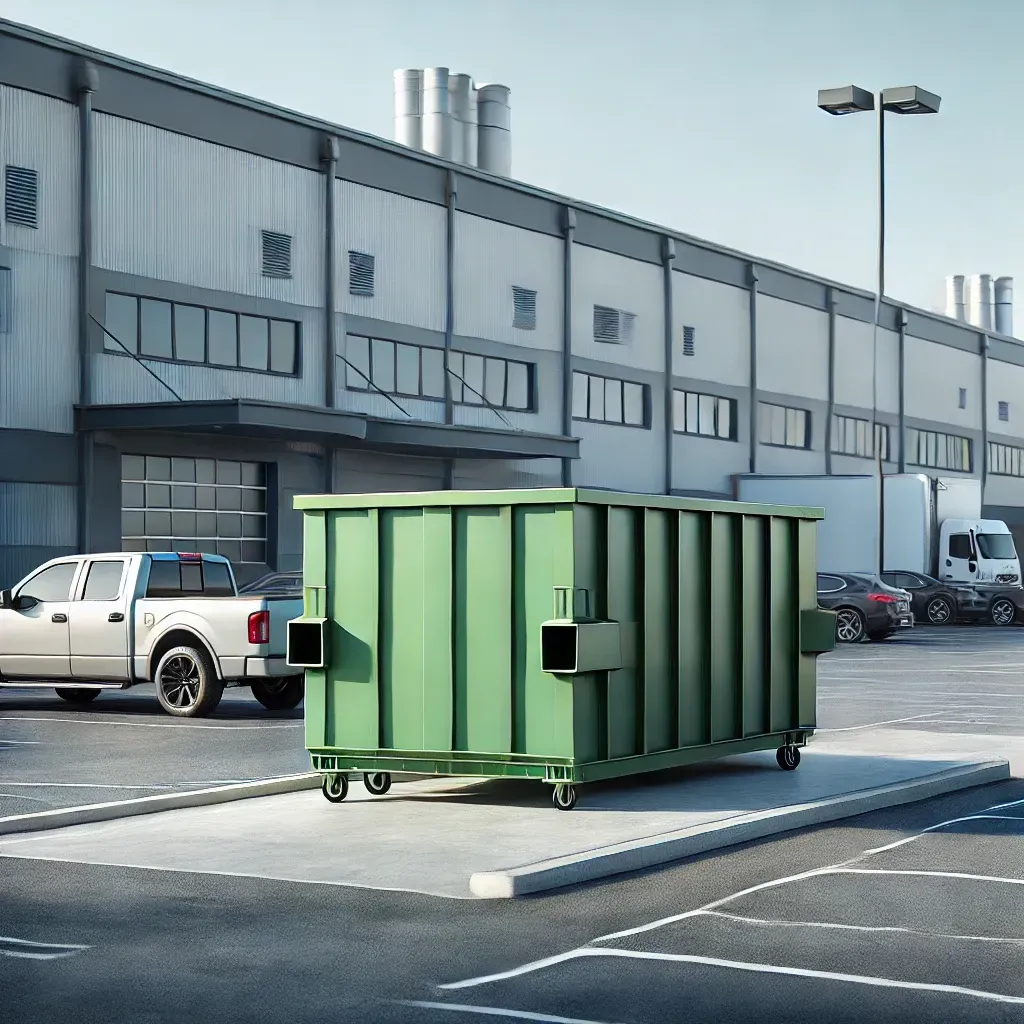
October 29, 2024
In today’s fast-paced business environment, unexpected events can arise at any time, requiring immediate attention. For many facilities and businesses, managing waste in an emergency is a critical component of maintaining safety, hygiene, and operational continuity. Waste Cost Solutions offers a 24/7 Emergency Dumpster Service to provide efficient, reliable solutions when time is of the essence. What Is a Dumpster Emergency? A dumpster emergency can arise from various situations, including: Natural Disasters: Hurricanes, floods, and other weather-related events can lead to unexpected amounts of debris. Facility Accidents: Fires, leaks, and structural damage can create large quantities of waste requiring swift removal. Construction or Renovation Surprises: Projects can occasionally yield more waste than anticipated, resulting in the need for additional or larger dumpsters. Event Cleanups: Large gatherings or events may generate more waste than initially planned. These scenarios require a prompt, dependable waste solution that can minimize disruption and restore normalcy as quickly as possible. Waste Cost Solutions' 24/7 Emergency Dumpster Service Our Emergency Dumpster Service is designed to provide immediate, flexible options to businesses and facilities in need. Here’s how Waste Cost Solutions supports your operations when an emergency strikes: Rapid Response: Our team is available around the clock to ensure you get a dumpster on-site quickly, minimizing downtime and allowing you to focus on other urgent tasks. Flexible Sizes: We offer dumpsters in a variety of sizes, so whether you’re dealing with a small-scale cleanup or a major debris haul, we have the right solution to fit your needs. Compliance and Safety: Waste Cost Solutions takes all necessary steps to dispose of waste safely and in full compliance with local regulations. Expert Assistance: Our trained professionals are equipped to handle complex emergency scenarios, ensuring efficient waste removal that prioritizes your facility’s safety and cleanliness. Steps to Handle a Dumpster Emergency When faced with an emergency that requires additional waste management support, here’s a quick guide to managing the situation: Assess the Scope: Determine the scale of the waste or debris. This will help in selecting the appropriate dumpster size and ensuring timely removal. Contact Waste Cost Solutions Immediately: Call us 24/7 to request a dumpster. Our team will guide you through the necessary steps and provide the best solution based on your needs. Coordinate Clear Access: Make sure that the delivery area is clear and accessible. This will help speed up the delivery and ensure safe placement of the dumpster. Follow Safety Protocols: Ensure your team adheres to safety guidelines during the cleanup to prevent injuries and other hazards. Plan for Waste Removal and Disposal: Coordinate with our team on pickup schedules to maintain a clean, safe environment throughout the emergency cleanup process. Why Choose Waste Cost Solutions for Emergency Waste Management? Emergency situations demand efficient, reliable, and experienced waste management partners. Waste Cost Solutions combines speed with professionalism, so you can rest assured that your waste management needs are met with care and expertise. Benefits of our 24/7 Emergency Service: Immediate Availability: Our team is on standby for emergency situations, ensuring that your waste management needs are met when it matters most. Professional Equipment: We provide well-maintained, durable dumpsters that are ready to handle even the toughest debris. Experienced Support: With years of experience in waste management, we’re prepared to address a wide range of emergency scenarios with effective solutions. Conclusion Dumpster emergencies can be challenging, but with Waste Cost Solutions as your partner, you have access to fast, professional support whenever you need it. Our 24/7 Emergency Dumpster Services ensures that your business or facility is prepared for the unexpected, with timely solutions that keep you on track. For more information or to request an emergency dumpster, contact Waste Cost Solutions today. We're here to support you in any situation, ensuring a safe and efficient resolution to your waste management needs.
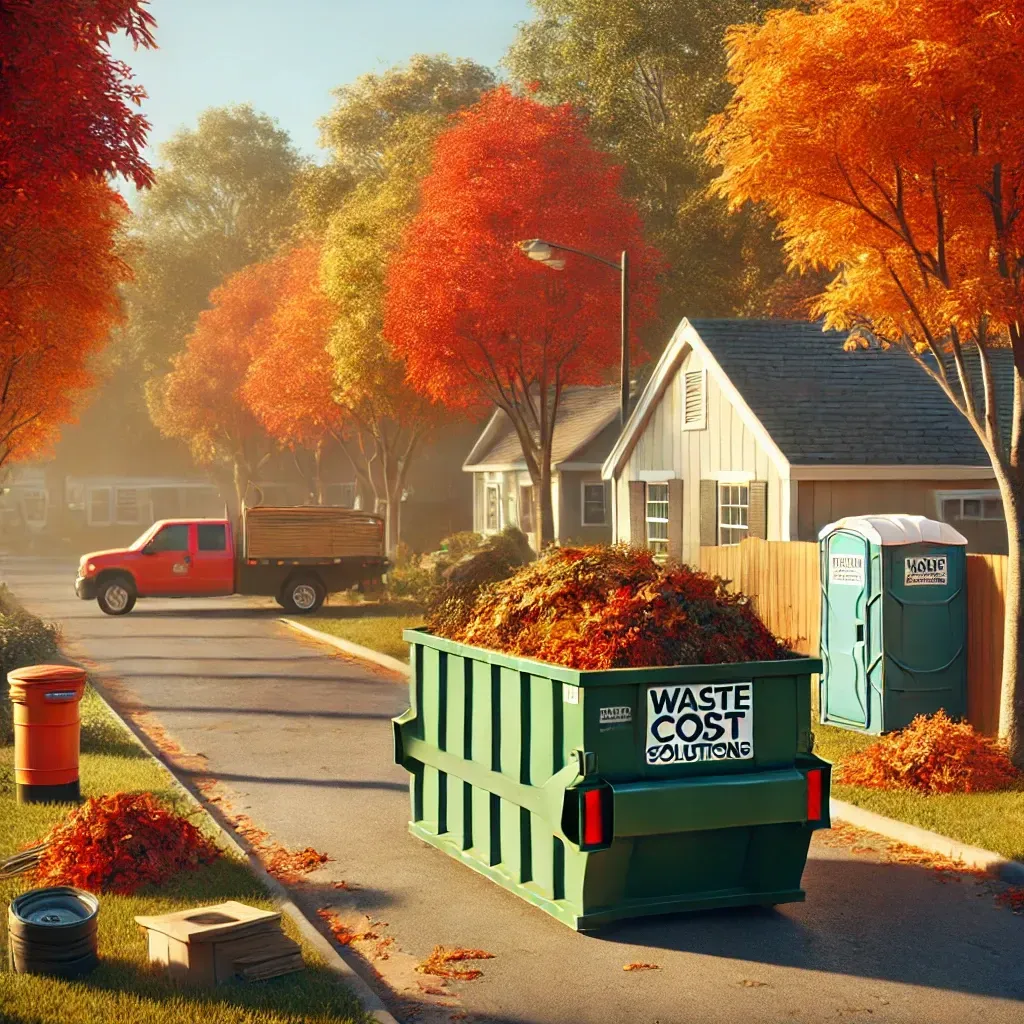
September 23, 2024
As the leaves change to vibrant shades of red, orange, and yellow, and the crispness in the air signals the start of autumn, all of us at Waste Cost Solutions would like to extend our warmest wishes for a wonderful season ahead. Autumn is a time of reflection, preparation, and renewal. Whether it’s cleaning up your home or getting your business ready for the coming months, this season offers a great opportunity to take care of your waste disposal needs efficiently. At Waste Cost Solutions, we are committed to providing you with top-tier waste management services, ensuring that your environment stays clean and your processes run smoothly. Preparing for Seasonal Cleanups With the falling leaves and increased outdoor activity, many homeowners and businesses find themselves facing larger amounts of yard and facility waste. Now is the perfect time to plan ahead for those seasonal cleanups. Whether you need roll-off dumpsters for big projects or regular waste disposal services, we’re here to help. Our wide range of solutions includes everything from luxury portable restrooms to temporary fencing and recycling options for businesses of all sizes. If you're preparing for a busy season of events, renovations, or other projects, Waste Cost Solutions can provide the right services to keep things running smoothly. Sustainable Waste Solutions for the Fall Autumn is also a great time to think about sustainability. As part of our commitment to environmental responsibility, we encourage you to consider eco-friendly waste management solutions. From recycling programs to onsite waste reduction strategies, there are many ways to make your waste management practices more sustainable this season. Let us help you take the next step toward a greener future. Stay Connected with Us We hope this season brings you all the warmth and beauty autumn has to offer. As always, if you need assistance or have questions about our services, our team is ready to support you. Reach out to us anytime to learn more about how we can tailor our solutions to your specific needs. Enjoy the colors and festivities of the season, and thank you for continuing to trust Waste Cost Solutions for all your waste management needs!
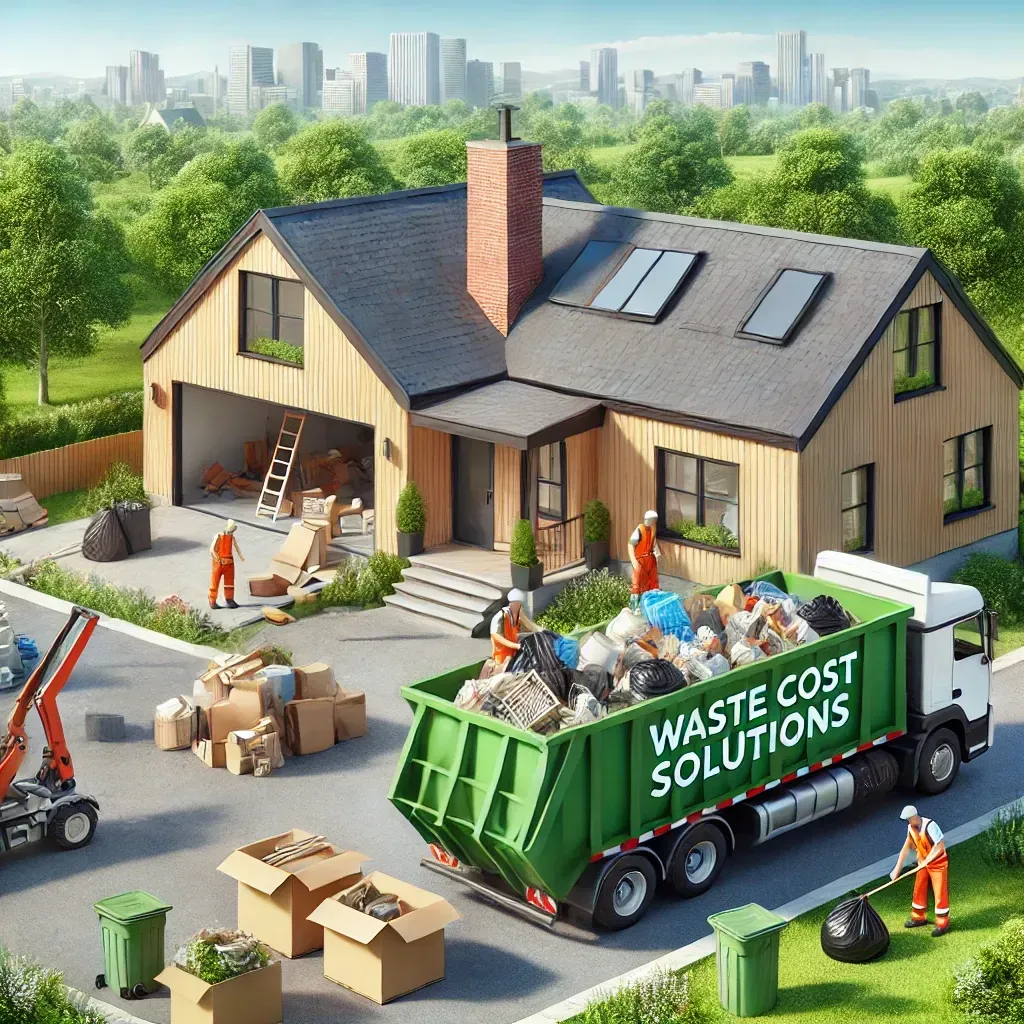
By Sam Morady
•
September 9, 2024
When it comes to tackling big projects like home renovations, landscaping, or large cleanouts, waste can quickly pile up and cause unnecessary stress. Fortunately, Waste Cost Solutions is here to help you streamline the cleanup process with our hassle-free dumpster rental services. Why Rent a Dumpster? Whether you're a homeowner or contractor, renting a dumpster ensures you have a convenient and efficient way to dispose of large amounts of waste. Here’s why you should consider a dumpster rental for your next project: 1. A Size for Every Project No two projects are alike, and that's why we offer a variety of dumpster sizes to meet your specific needs. From small cleanouts to large-scale construction, our dumpsters can handle it all. If you're unsure what size you need, our team is always available to guide you to the perfect fit. 2. Quick and Convenient Delivery At Waste Cost Solutions, we understand that timing is critical for your projects. That’s why we provide prompt delivery and pick-up services. Schedule the delivery at your convenience, and once your job is complete, we’ll take care of removing the waste—no extra steps or stress for you. 3. Eco-Friendly Disposal Taking care of the environment is a top priority for us. When you rent a dumpster from Waste Cost Solutions, you can rest easy knowing that your waste will be disposed of responsibly. We focus on recycling materials where possible to reduce landfill waste and promote sustainability. 4. Competitive, Transparent Pricing With Waste Cost Solutions, there are no surprises. We offer affordable and transparent pricing, so you know exactly what to expect. Plus, we pride ourselves on our customer-first approach, ensuring that you get great value without the hidden fees. How to Get Started Ready to make your next project easier? Renting a dumpster is just a phone call or click away. Simply contact us at 561-417-0415 or visit our website to learn more and schedule your dumpster rental today. Conclusion No matter the size or scope of your project, Waste Cost Solutions is here to help you manage your waste efficiently and affordably. Don’t let the debris slow you down—rent a dumpster today and keep your project moving forward!
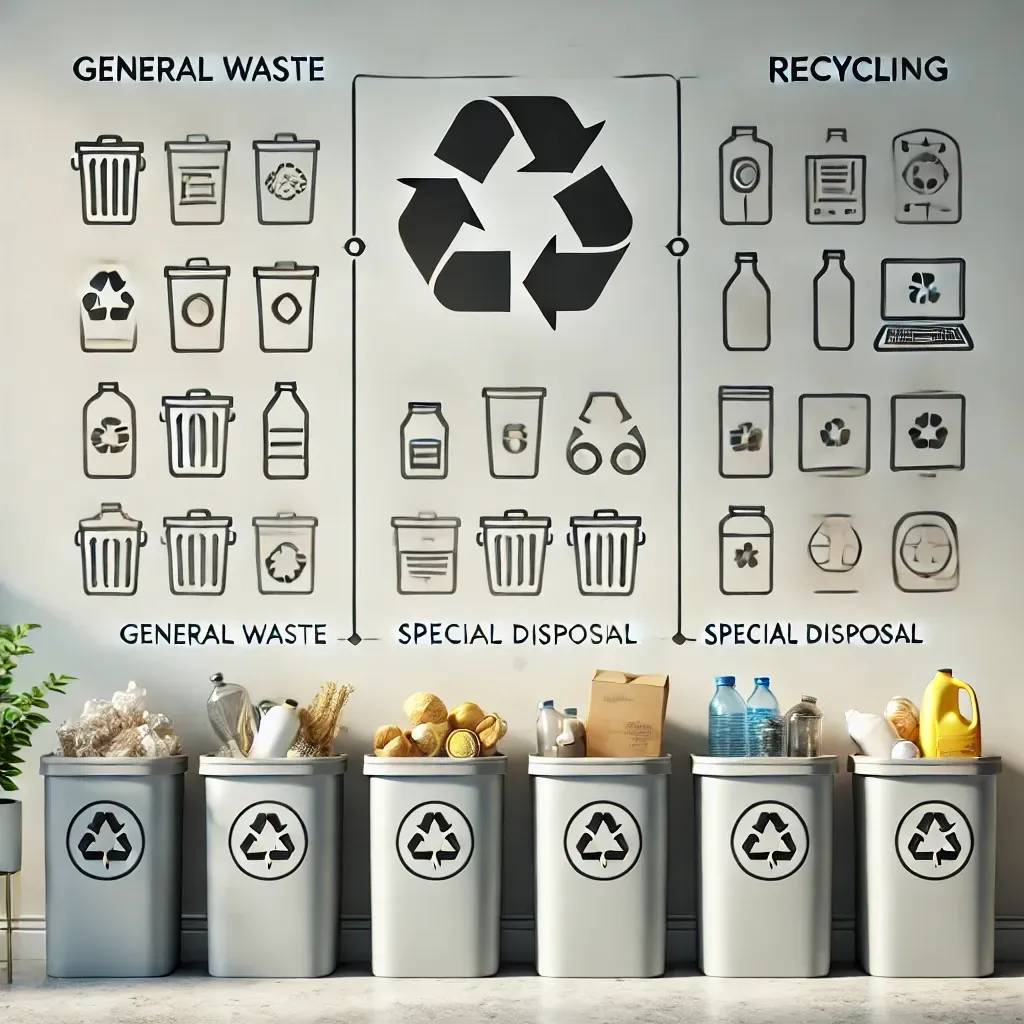
By Sam Morady
•
September 6, 2024
Waste management can be tricky, especially when you're unsure about what you can and cannot dispose of. At Waste Cost Solutions, we aim to make waste disposal as easy and efficient as possible. This guide will help you understand the differences between general waste, recyclables, and items that require special disposal. Properly sorting your waste not only ensures that your waste management is smooth but also contributes to a healthier, eco-friendly environment. Let's break down what goes where: General Waste General waste includes items that cannot be recycled and do not require special handling. These are the most common types of waste you generate at home or in the office. Here are some examples: Food scraps: Leftover food, peels, and other organic materials. Non-recyclable paper: This includes napkins, tissues, and other paper products that cannot be cleaned or reused. Broken ceramics or glass: While whole glass can often be recycled, broken glass should be carefully wrapped and placed in general waste for safety reasons. Recycling Recycling is one of the easiest ways to reduce waste and support the environment. However, it’s crucial to know what items are recyclable to avoid contamination of your recycling bin. Here’s what can typically be recycled: Clean paper, cardboard, and magazines: Paper products should be free of food residue or grease. Plastic bottles and containers: Make sure to rinse them out to avoid contamination in the recycling process. Glass bottles and jars: Similar to plastics, ensure these are rinsed before tossing them into the recycling bin. By properly sorting recyclables, you help conserve energy and natural resources while reducing landfill waste. Special Disposal Some items cannot be thrown away in regular trash or recycling bins due to their hazardous nature or the need for special handling. These items include: Electronics: Computers, phones, and other electronic devices often contain harmful materials and should be disposed of at a certified e-waste facility. Hazardous materials: Paint, batteries, chemicals, and other hazardous waste must be disposed of safely. Check with your local waste management provider for drop-off locations. Large appliances and furniture: These bulky items often require special pickup or drop-off arrangements. Contact your waste disposal provider to schedule a removal service. Unsure About an Item? If you’re ever in doubt about what can and cannot be thrown away, feel free to contact Waste Cost Solutions for guidance. We're here to help you manage your waste responsibly. You can also visit our website for a more detailed breakdown of disposal rules. At Waste Cost Solutions, we’re committed to keeping your waste management efficient and environmentally friendly. Thank you for choosing us to handle your waste disposal needs!

By Sam Morady
•
August 26, 2024
Effective waste management is not just about disposing of waste; it’s about doing so in a way that is responsible, efficient, and environmentally friendly. Whether you're managing waste for a business, facility, or household, following best practices can significantly impact both the environment and your bottom line. Here’s a guide on the essential dos and don’ts of waste management to help you optimize your waste disposal processes. The Dos 1. Do Sort Waste Properly One of the most critical aspects of waste management is proper sorting. Separate recyclables like paper, glass, plastics, and metals from organic waste and non-recyclables. This not only helps in reducing landfill waste but also conserves natural resources by allowing materials to be reused. 2. Do Use Certified Waste Disposal Companies When outsourcing your waste management, ensure you use certified and reputable waste disposal companies. Certified companies adhere to regulations and ensure that waste is disposed of safely and legally, reducing the risk of environmental contamination and legal issues. 3. Do Educate Your Team Whether it’s your employees, family members, or community, educating them about proper waste disposal practices is essential. Regular training and clear signage can help everyone understand what can be recycled, composted, or needs to be disposed of differently, leading to better compliance and less waste. 4. Do Consider Waste Reduction Strategies Reducing the amount of waste you produce is one of the most effective waste management strategies. Implement practices like reusing materials, choosing products with less packaging, and composting organic waste to minimize the amount of waste that needs to be managed. 5. Do Follow Local Waste Disposal Regulations Every region has its own waste disposal regulations, and it’s essential to follow these closely. Staying compliant not only helps you avoid fines and penalties but also ensures that waste is being managed in an environmentally responsible manner. The Don’ts 1. Don’t Mix Hazardous and Non-Hazardous Waste Mixing hazardous waste with regular waste can lead to severe environmental damage and poses significant health risks. Always dispose of hazardous materials like chemicals, batteries, and medical waste separately, following the specific guidelines for their disposal. 2. Don’t Ignore Recycling Opportunities Recycling is a key component of sustainable waste management. Don’t throw away items that can be recycled. Ensure that you have dedicated recycling bins and that everyone is aware of what can and cannot be recycled to maximize your recycling efforts. 3. Don’t Overfill Waste Containers Overfilling waste containers can lead to spillage, attract pests, and create a mess that requires additional cleanup. Make sure that your waste containers are appropriately sized for your needs and are emptied regularly to maintain a clean and safe environment. 4. Don’t Dispose of E-Waste with Regular Trash Electronic waste, such as old computers, phones, and other gadgets, should never be disposed of with regular trash. E-waste contains harmful materials that can contaminate the environment if not disposed of properly. Instead, take advantage of e-waste recycling programs or dispose of them through certified e-waste disposal services. 5. Don’t Neglect Regular Waste Audits Regular waste audits help you understand the types and amounts of waste you generate, allowing you to implement better waste management practices. Neglecting these audits can result in missed opportunities for waste reduction and increased disposal costs. Conclusion Effective waste management is crucial for both environmental stewardship and operational efficiency. By following these dos and don’ts, you can ensure that your waste management practices are responsible, cost-effective, and compliant with all regulations. Waste Cost Solutions is here to assist you with all your waste management needs, offering expert services that align with these best practices. Contact us today to learn more about how we can help you manage your waste more effectively.

By Tim Cavanaugh
•
September 30, 2025
As the cooler temperatures roll in and the leaves begin to fall, now is the perfect time to tackle one of the most neglected spaces in your home: the garage. If yours has become a cluttered catch-all for tools, boxes, old furniture, broken appliances, or holiday decorations, you're not alone. A fall garage cleanout can be incredibly satisfying—but it can also be overwhelming. That’s where a dumpster rental comes in. Whether you're doing a full purge or just reorganizing, here’s why renting a dumpster this fall is the smart (and stress-free) way to get the job done. 🍁 1. Fall Is the Ideal Time to Declutter Fall gives you that sweet spot of comfortable weather—not too hot, not too cold—which is perfect for hauling items in and out of your garage. Plus, with the holidays approaching, it’s a great time to clear out space before guests arrive or decorations come down from storage. 🗑 2. You’ll Have One Place for Everything You’re Tossing Sorting through a garage often means dealing with a mix of junk—broken tools, damaged furniture, cardboard boxes, yard waste, old paint cans, and who-knows-what else. A dumpster lets you throw it all in one place, saving time and eliminating the need for multiple trash bags or trips to the dump. 🚗 3. Reclaim Your Parking Space Before Winter One of the best motivations for cleaning out your garage in the fall? Snow is coming. Don’t get stuck scraping ice off your windshield in January because your garage is too full to park in. A dumpster rental makes it easier to toss bulky items fast and finally make space for your vehicle. 🧹 4. Safer, Cleaner, and More Organized Cluttered garages aren't just an eyesore—they’re a safety hazard. Tripping over boxes or navigating through piles can lead to accidents, especially if tools or chemicals are involved. Cleaning it out with the help of a dumpster means a cleaner, safer space for your family. ⏳ 5. Save Time and Energy Without a dumpster, you'd be sorting trash into piles, bagging everything, and taking load after load to the landfill or recycling center. That’s hours of extra work. With a dumpster parked in your driveway, just toss as you go—then let the rental company handle the rest. ♻️ 6. Great for Donations and Recycling Too Not everything in your garage needs to be trashed—some items may be perfect for donation or recycling. As you sort, you can easily separate salvageable items, while tossing damaged or unusable ones into the dumpster. It streamlines the entire process. 📦 7. Set Yourself Up for an Easier Spring A fall garage cleanout means you start the new year with a clean slate. When spring arrives, you won’t be greeted by a cluttered mess—you’ll already be organized and ready for whatever projects come next. Ready to Clean Out Your Garage This Fall? If you're planning a garage cleanout, a dumpster rental is your best friend. It simplifies the process, saves time, and helps you get rid of everything in one go. Plus, most rental companies offer flexible drop-off and pickup options, so you can work at your own pace. Don't wait until the snow flies—schedule your dumpster rental today and enjoy a cleaner, safer, and more organized garage this fall.

October 29, 2024
In today’s fast-paced business environment, unexpected events can arise at any time, requiring immediate attention. For many facilities and businesses, managing waste in an emergency is a critical component of maintaining safety, hygiene, and operational continuity. Waste Cost Solutions offers a 24/7 Emergency Dumpster Service to provide efficient, reliable solutions when time is of the essence. What Is a Dumpster Emergency? A dumpster emergency can arise from various situations, including: Natural Disasters: Hurricanes, floods, and other weather-related events can lead to unexpected amounts of debris. Facility Accidents: Fires, leaks, and structural damage can create large quantities of waste requiring swift removal. Construction or Renovation Surprises: Projects can occasionally yield more waste than anticipated, resulting in the need for additional or larger dumpsters. Event Cleanups: Large gatherings or events may generate more waste than initially planned. These scenarios require a prompt, dependable waste solution that can minimize disruption and restore normalcy as quickly as possible. Waste Cost Solutions' 24/7 Emergency Dumpster Service Our Emergency Dumpster Service is designed to provide immediate, flexible options to businesses and facilities in need. Here’s how Waste Cost Solutions supports your operations when an emergency strikes: Rapid Response: Our team is available around the clock to ensure you get a dumpster on-site quickly, minimizing downtime and allowing you to focus on other urgent tasks. Flexible Sizes: We offer dumpsters in a variety of sizes, so whether you’re dealing with a small-scale cleanup or a major debris haul, we have the right solution to fit your needs. Compliance and Safety: Waste Cost Solutions takes all necessary steps to dispose of waste safely and in full compliance with local regulations. Expert Assistance: Our trained professionals are equipped to handle complex emergency scenarios, ensuring efficient waste removal that prioritizes your facility’s safety and cleanliness. Steps to Handle a Dumpster Emergency When faced with an emergency that requires additional waste management support, here’s a quick guide to managing the situation: Assess the Scope: Determine the scale of the waste or debris. This will help in selecting the appropriate dumpster size and ensuring timely removal. Contact Waste Cost Solutions Immediately: Call us 24/7 to request a dumpster. Our team will guide you through the necessary steps and provide the best solution based on your needs. Coordinate Clear Access: Make sure that the delivery area is clear and accessible. This will help speed up the delivery and ensure safe placement of the dumpster. Follow Safety Protocols: Ensure your team adheres to safety guidelines during the cleanup to prevent injuries and other hazards. Plan for Waste Removal and Disposal: Coordinate with our team on pickup schedules to maintain a clean, safe environment throughout the emergency cleanup process. Why Choose Waste Cost Solutions for Emergency Waste Management? Emergency situations demand efficient, reliable, and experienced waste management partners. Waste Cost Solutions combines speed with professionalism, so you can rest assured that your waste management needs are met with care and expertise. Benefits of our 24/7 Emergency Service: Immediate Availability: Our team is on standby for emergency situations, ensuring that your waste management needs are met when it matters most. Professional Equipment: We provide well-maintained, durable dumpsters that are ready to handle even the toughest debris. Experienced Support: With years of experience in waste management, we’re prepared to address a wide range of emergency scenarios with effective solutions. Conclusion Dumpster emergencies can be challenging, but with Waste Cost Solutions as your partner, you have access to fast, professional support whenever you need it. Our 24/7 Emergency Dumpster Services ensures that your business or facility is prepared for the unexpected, with timely solutions that keep you on track. For more information or to request an emergency dumpster, contact Waste Cost Solutions today. We're here to support you in any situation, ensuring a safe and efficient resolution to your waste management needs.

September 23, 2024
As the leaves change to vibrant shades of red, orange, and yellow, and the crispness in the air signals the start of autumn, all of us at Waste Cost Solutions would like to extend our warmest wishes for a wonderful season ahead. Autumn is a time of reflection, preparation, and renewal. Whether it’s cleaning up your home or getting your business ready for the coming months, this season offers a great opportunity to take care of your waste disposal needs efficiently. At Waste Cost Solutions, we are committed to providing you with top-tier waste management services, ensuring that your environment stays clean and your processes run smoothly. Preparing for Seasonal Cleanups With the falling leaves and increased outdoor activity, many homeowners and businesses find themselves facing larger amounts of yard and facility waste. Now is the perfect time to plan ahead for those seasonal cleanups. Whether you need roll-off dumpsters for big projects or regular waste disposal services, we’re here to help. Our wide range of solutions includes everything from luxury portable restrooms to temporary fencing and recycling options for businesses of all sizes. If you're preparing for a busy season of events, renovations, or other projects, Waste Cost Solutions can provide the right services to keep things running smoothly. Sustainable Waste Solutions for the Fall Autumn is also a great time to think about sustainability. As part of our commitment to environmental responsibility, we encourage you to consider eco-friendly waste management solutions. From recycling programs to onsite waste reduction strategies, there are many ways to make your waste management practices more sustainable this season. Let us help you take the next step toward a greener future. Stay Connected with Us We hope this season brings you all the warmth and beauty autumn has to offer. As always, if you need assistance or have questions about our services, our team is ready to support you. Reach out to us anytime to learn more about how we can tailor our solutions to your specific needs. Enjoy the colors and festivities of the season, and thank you for continuing to trust Waste Cost Solutions for all your waste management needs!

By Sam Morady
•
September 9, 2024
When it comes to tackling big projects like home renovations, landscaping, or large cleanouts, waste can quickly pile up and cause unnecessary stress. Fortunately, Waste Cost Solutions is here to help you streamline the cleanup process with our hassle-free dumpster rental services. Why Rent a Dumpster? Whether you're a homeowner or contractor, renting a dumpster ensures you have a convenient and efficient way to dispose of large amounts of waste. Here’s why you should consider a dumpster rental for your next project: 1. A Size for Every Project No two projects are alike, and that's why we offer a variety of dumpster sizes to meet your specific needs. From small cleanouts to large-scale construction, our dumpsters can handle it all. If you're unsure what size you need, our team is always available to guide you to the perfect fit. 2. Quick and Convenient Delivery At Waste Cost Solutions, we understand that timing is critical for your projects. That’s why we provide prompt delivery and pick-up services. Schedule the delivery at your convenience, and once your job is complete, we’ll take care of removing the waste—no extra steps or stress for you. 3. Eco-Friendly Disposal Taking care of the environment is a top priority for us. When you rent a dumpster from Waste Cost Solutions, you can rest easy knowing that your waste will be disposed of responsibly. We focus on recycling materials where possible to reduce landfill waste and promote sustainability. 4. Competitive, Transparent Pricing With Waste Cost Solutions, there are no surprises. We offer affordable and transparent pricing, so you know exactly what to expect. Plus, we pride ourselves on our customer-first approach, ensuring that you get great value without the hidden fees. How to Get Started Ready to make your next project easier? Renting a dumpster is just a phone call or click away. Simply contact us at 561-417-0415 or visit our website to learn more and schedule your dumpster rental today. Conclusion No matter the size or scope of your project, Waste Cost Solutions is here to help you manage your waste efficiently and affordably. Don’t let the debris slow you down—rent a dumpster today and keep your project moving forward!

By Sam Morady
•
September 6, 2024
Waste management can be tricky, especially when you're unsure about what you can and cannot dispose of. At Waste Cost Solutions, we aim to make waste disposal as easy and efficient as possible. This guide will help you understand the differences between general waste, recyclables, and items that require special disposal. Properly sorting your waste not only ensures that your waste management is smooth but also contributes to a healthier, eco-friendly environment. Let's break down what goes where: General Waste General waste includes items that cannot be recycled and do not require special handling. These are the most common types of waste you generate at home or in the office. Here are some examples: Food scraps: Leftover food, peels, and other organic materials. Non-recyclable paper: This includes napkins, tissues, and other paper products that cannot be cleaned or reused. Broken ceramics or glass: While whole glass can often be recycled, broken glass should be carefully wrapped and placed in general waste for safety reasons. Recycling Recycling is one of the easiest ways to reduce waste and support the environment. However, it’s crucial to know what items are recyclable to avoid contamination of your recycling bin. Here’s what can typically be recycled: Clean paper, cardboard, and magazines: Paper products should be free of food residue or grease. Plastic bottles and containers: Make sure to rinse them out to avoid contamination in the recycling process. Glass bottles and jars: Similar to plastics, ensure these are rinsed before tossing them into the recycling bin. By properly sorting recyclables, you help conserve energy and natural resources while reducing landfill waste. Special Disposal Some items cannot be thrown away in regular trash or recycling bins due to their hazardous nature or the need for special handling. These items include: Electronics: Computers, phones, and other electronic devices often contain harmful materials and should be disposed of at a certified e-waste facility. Hazardous materials: Paint, batteries, chemicals, and other hazardous waste must be disposed of safely. Check with your local waste management provider for drop-off locations. Large appliances and furniture: These bulky items often require special pickup or drop-off arrangements. Contact your waste disposal provider to schedule a removal service. Unsure About an Item? If you’re ever in doubt about what can and cannot be thrown away, feel free to contact Waste Cost Solutions for guidance. We're here to help you manage your waste responsibly. You can also visit our website for a more detailed breakdown of disposal rules. At Waste Cost Solutions, we’re committed to keeping your waste management efficient and environmentally friendly. Thank you for choosing us to handle your waste disposal needs!

By Sam Morady
•
August 26, 2024
Effective waste management is not just about disposing of waste; it’s about doing so in a way that is responsible, efficient, and environmentally friendly. Whether you're managing waste for a business, facility, or household, following best practices can significantly impact both the environment and your bottom line. Here’s a guide on the essential dos and don’ts of waste management to help you optimize your waste disposal processes. The Dos 1. Do Sort Waste Properly One of the most critical aspects of waste management is proper sorting. Separate recyclables like paper, glass, plastics, and metals from organic waste and non-recyclables. This not only helps in reducing landfill waste but also conserves natural resources by allowing materials to be reused. 2. Do Use Certified Waste Disposal Companies When outsourcing your waste management, ensure you use certified and reputable waste disposal companies. Certified companies adhere to regulations and ensure that waste is disposed of safely and legally, reducing the risk of environmental contamination and legal issues. 3. Do Educate Your Team Whether it’s your employees, family members, or community, educating them about proper waste disposal practices is essential. Regular training and clear signage can help everyone understand what can be recycled, composted, or needs to be disposed of differently, leading to better compliance and less waste. 4. Do Consider Waste Reduction Strategies Reducing the amount of waste you produce is one of the most effective waste management strategies. Implement practices like reusing materials, choosing products with less packaging, and composting organic waste to minimize the amount of waste that needs to be managed. 5. Do Follow Local Waste Disposal Regulations Every region has its own waste disposal regulations, and it’s essential to follow these closely. Staying compliant not only helps you avoid fines and penalties but also ensures that waste is being managed in an environmentally responsible manner. The Don’ts 1. Don’t Mix Hazardous and Non-Hazardous Waste Mixing hazardous waste with regular waste can lead to severe environmental damage and poses significant health risks. Always dispose of hazardous materials like chemicals, batteries, and medical waste separately, following the specific guidelines for their disposal. 2. Don’t Ignore Recycling Opportunities Recycling is a key component of sustainable waste management. Don’t throw away items that can be recycled. Ensure that you have dedicated recycling bins and that everyone is aware of what can and cannot be recycled to maximize your recycling efforts. 3. Don’t Overfill Waste Containers Overfilling waste containers can lead to spillage, attract pests, and create a mess that requires additional cleanup. Make sure that your waste containers are appropriately sized for your needs and are emptied regularly to maintain a clean and safe environment. 4. Don’t Dispose of E-Waste with Regular Trash Electronic waste, such as old computers, phones, and other gadgets, should never be disposed of with regular trash. E-waste contains harmful materials that can contaminate the environment if not disposed of properly. Instead, take advantage of e-waste recycling programs or dispose of them through certified e-waste disposal services. 5. Don’t Neglect Regular Waste Audits Regular waste audits help you understand the types and amounts of waste you generate, allowing you to implement better waste management practices. Neglecting these audits can result in missed opportunities for waste reduction and increased disposal costs. Conclusion Effective waste management is crucial for both environmental stewardship and operational efficiency. By following these dos and don’ts, you can ensure that your waste management practices are responsible, cost-effective, and compliant with all regulations. Waste Cost Solutions is here to assist you with all your waste management needs, offering expert services that align with these best practices. Contact us today to learn more about how we can help you manage your waste more effectively.
Waste Cost Solutions News
Welcome to the Waste Cost Solutions Blog, your go-to resource for insights, tips, and updates on all things related to waste management. Our blog is dedicated to readers staying informed about the latest trends, best practices, and innovative solutions in the industry.

By Tim Cavanaugh
•
September 30, 2025
As the cooler temperatures roll in and the leaves begin to fall, now is the perfect time to tackle one of the most neglected spaces in your home: the garage. If yours has become a cluttered catch-all for tools, boxes, old furniture, broken appliances, or holiday decorations, you're not alone. A fall garage cleanout can be incredibly satisfying—but it can also be overwhelming. That’s where a dumpster rental comes in. Whether you're doing a full purge or just reorganizing, here’s why renting a dumpster this fall is the smart (and stress-free) way to get the job done. 🍁 1. Fall Is the Ideal Time to Declutter Fall gives you that sweet spot of comfortable weather—not too hot, not too cold—which is perfect for hauling items in and out of your garage. Plus, with the holidays approaching, it’s a great time to clear out space before guests arrive or decorations come down from storage. 🗑 2. You’ll Have One Place for Everything You’re Tossing Sorting through a garage often means dealing with a mix of junk—broken tools, damaged furniture, cardboard boxes, yard waste, old paint cans, and who-knows-what else. A dumpster lets you throw it all in one place, saving time and eliminating the need for multiple trash bags or trips to the dump. 🚗 3. Reclaim Your Parking Space Before Winter One of the best motivations for cleaning out your garage in the fall? Snow is coming. Don’t get stuck scraping ice off your windshield in January because your garage is too full to park in. A dumpster rental makes it easier to toss bulky items fast and finally make space for your vehicle. 🧹 4. Safer, Cleaner, and More Organized Cluttered garages aren't just an eyesore—they’re a safety hazard. Tripping over boxes or navigating through piles can lead to accidents, especially if tools or chemicals are involved. Cleaning it out with the help of a dumpster means a cleaner, safer space for your family. ⏳ 5. Save Time and Energy Without a dumpster, you'd be sorting trash into piles, bagging everything, and taking load after load to the landfill or recycling center. That’s hours of extra work. With a dumpster parked in your driveway, just toss as you go—then let the rental company handle the rest. ♻️ 6. Great for Donations and Recycling Too Not everything in your garage needs to be trashed—some items may be perfect for donation or recycling. As you sort, you can easily separate salvageable items, while tossing damaged or unusable ones into the dumpster. It streamlines the entire process. 📦 7. Set Yourself Up for an Easier Spring A fall garage cleanout means you start the new year with a clean slate. When spring arrives, you won’t be greeted by a cluttered mess—you’ll already be organized and ready for whatever projects come next. Ready to Clean Out Your Garage This Fall? If you're planning a garage cleanout, a dumpster rental is your best friend. It simplifies the process, saves time, and helps you get rid of everything in one go. Plus, most rental companies offer flexible drop-off and pickup options, so you can work at your own pace. Don't wait until the snow flies—schedule your dumpster rental today and enjoy a cleaner, safer, and more organized garage this fall.

October 29, 2024
In today’s fast-paced business environment, unexpected events can arise at any time, requiring immediate attention. For many facilities and businesses, managing waste in an emergency is a critical component of maintaining safety, hygiene, and operational continuity. Waste Cost Solutions offers a 24/7 Emergency Dumpster Service to provide efficient, reliable solutions when time is of the essence. What Is a Dumpster Emergency? A dumpster emergency can arise from various situations, including: Natural Disasters: Hurricanes, floods, and other weather-related events can lead to unexpected amounts of debris. Facility Accidents: Fires, leaks, and structural damage can create large quantities of waste requiring swift removal. Construction or Renovation Surprises: Projects can occasionally yield more waste than anticipated, resulting in the need for additional or larger dumpsters. Event Cleanups: Large gatherings or events may generate more waste than initially planned. These scenarios require a prompt, dependable waste solution that can minimize disruption and restore normalcy as quickly as possible. Waste Cost Solutions' 24/7 Emergency Dumpster Service Our Emergency Dumpster Service is designed to provide immediate, flexible options to businesses and facilities in need. Here’s how Waste Cost Solutions supports your operations when an emergency strikes: Rapid Response: Our team is available around the clock to ensure you get a dumpster on-site quickly, minimizing downtime and allowing you to focus on other urgent tasks. Flexible Sizes: We offer dumpsters in a variety of sizes, so whether you’re dealing with a small-scale cleanup or a major debris haul, we have the right solution to fit your needs. Compliance and Safety: Waste Cost Solutions takes all necessary steps to dispose of waste safely and in full compliance with local regulations. Expert Assistance: Our trained professionals are equipped to handle complex emergency scenarios, ensuring efficient waste removal that prioritizes your facility’s safety and cleanliness. Steps to Handle a Dumpster Emergency When faced with an emergency that requires additional waste management support, here’s a quick guide to managing the situation: Assess the Scope: Determine the scale of the waste or debris. This will help in selecting the appropriate dumpster size and ensuring timely removal. Contact Waste Cost Solutions Immediately: Call us 24/7 to request a dumpster. Our team will guide you through the necessary steps and provide the best solution based on your needs. Coordinate Clear Access: Make sure that the delivery area is clear and accessible. This will help speed up the delivery and ensure safe placement of the dumpster. Follow Safety Protocols: Ensure your team adheres to safety guidelines during the cleanup to prevent injuries and other hazards. Plan for Waste Removal and Disposal: Coordinate with our team on pickup schedules to maintain a clean, safe environment throughout the emergency cleanup process. Why Choose Waste Cost Solutions for Emergency Waste Management? Emergency situations demand efficient, reliable, and experienced waste management partners. Waste Cost Solutions combines speed with professionalism, so you can rest assured that your waste management needs are met with care and expertise. Benefits of our 24/7 Emergency Service: Immediate Availability: Our team is on standby for emergency situations, ensuring that your waste management needs are met when it matters most. Professional Equipment: We provide well-maintained, durable dumpsters that are ready to handle even the toughest debris. Experienced Support: With years of experience in waste management, we’re prepared to address a wide range of emergency scenarios with effective solutions. Conclusion Dumpster emergencies can be challenging, but with Waste Cost Solutions as your partner, you have access to fast, professional support whenever you need it. Our 24/7 Emergency Dumpster Services ensures that your business or facility is prepared for the unexpected, with timely solutions that keep you on track. For more information or to request an emergency dumpster, contact Waste Cost Solutions today. We're here to support you in any situation, ensuring a safe and efficient resolution to your waste management needs.

September 23, 2024
As the leaves change to vibrant shades of red, orange, and yellow, and the crispness in the air signals the start of autumn, all of us at Waste Cost Solutions would like to extend our warmest wishes for a wonderful season ahead. Autumn is a time of reflection, preparation, and renewal. Whether it’s cleaning up your home or getting your business ready for the coming months, this season offers a great opportunity to take care of your waste disposal needs efficiently. At Waste Cost Solutions, we are committed to providing you with top-tier waste management services, ensuring that your environment stays clean and your processes run smoothly. Preparing for Seasonal Cleanups With the falling leaves and increased outdoor activity, many homeowners and businesses find themselves facing larger amounts of yard and facility waste. Now is the perfect time to plan ahead for those seasonal cleanups. Whether you need roll-off dumpsters for big projects or regular waste disposal services, we’re here to help. Our wide range of solutions includes everything from luxury portable restrooms to temporary fencing and recycling options for businesses of all sizes. If you're preparing for a busy season of events, renovations, or other projects, Waste Cost Solutions can provide the right services to keep things running smoothly. Sustainable Waste Solutions for the Fall Autumn is also a great time to think about sustainability. As part of our commitment to environmental responsibility, we encourage you to consider eco-friendly waste management solutions. From recycling programs to onsite waste reduction strategies, there are many ways to make your waste management practices more sustainable this season. Let us help you take the next step toward a greener future. Stay Connected with Us We hope this season brings you all the warmth and beauty autumn has to offer. As always, if you need assistance or have questions about our services, our team is ready to support you. Reach out to us anytime to learn more about how we can tailor our solutions to your specific needs. Enjoy the colors and festivities of the season, and thank you for continuing to trust Waste Cost Solutions for all your waste management needs!

By Sam Morady
•
September 9, 2024
When it comes to tackling big projects like home renovations, landscaping, or large cleanouts, waste can quickly pile up and cause unnecessary stress. Fortunately, Waste Cost Solutions is here to help you streamline the cleanup process with our hassle-free dumpster rental services. Why Rent a Dumpster? Whether you're a homeowner or contractor, renting a dumpster ensures you have a convenient and efficient way to dispose of large amounts of waste. Here’s why you should consider a dumpster rental for your next project: 1. A Size for Every Project No two projects are alike, and that's why we offer a variety of dumpster sizes to meet your specific needs. From small cleanouts to large-scale construction, our dumpsters can handle it all. If you're unsure what size you need, our team is always available to guide you to the perfect fit. 2. Quick and Convenient Delivery At Waste Cost Solutions, we understand that timing is critical for your projects. That’s why we provide prompt delivery and pick-up services. Schedule the delivery at your convenience, and once your job is complete, we’ll take care of removing the waste—no extra steps or stress for you. 3. Eco-Friendly Disposal Taking care of the environment is a top priority for us. When you rent a dumpster from Waste Cost Solutions, you can rest easy knowing that your waste will be disposed of responsibly. We focus on recycling materials where possible to reduce landfill waste and promote sustainability. 4. Competitive, Transparent Pricing With Waste Cost Solutions, there are no surprises. We offer affordable and transparent pricing, so you know exactly what to expect. Plus, we pride ourselves on our customer-first approach, ensuring that you get great value without the hidden fees. How to Get Started Ready to make your next project easier? Renting a dumpster is just a phone call or click away. Simply contact us at 561-417-0415 or visit our website to learn more and schedule your dumpster rental today. Conclusion No matter the size or scope of your project, Waste Cost Solutions is here to help you manage your waste efficiently and affordably. Don’t let the debris slow you down—rent a dumpster today and keep your project moving forward!

By Sam Morady
•
September 6, 2024
Waste management can be tricky, especially when you're unsure about what you can and cannot dispose of. At Waste Cost Solutions, we aim to make waste disposal as easy and efficient as possible. This guide will help you understand the differences between general waste, recyclables, and items that require special disposal. Properly sorting your waste not only ensures that your waste management is smooth but also contributes to a healthier, eco-friendly environment. Let's break down what goes where: General Waste General waste includes items that cannot be recycled and do not require special handling. These are the most common types of waste you generate at home or in the office. Here are some examples: Food scraps: Leftover food, peels, and other organic materials. Non-recyclable paper: This includes napkins, tissues, and other paper products that cannot be cleaned or reused. Broken ceramics or glass: While whole glass can often be recycled, broken glass should be carefully wrapped and placed in general waste for safety reasons. Recycling Recycling is one of the easiest ways to reduce waste and support the environment. However, it’s crucial to know what items are recyclable to avoid contamination of your recycling bin. Here’s what can typically be recycled: Clean paper, cardboard, and magazines: Paper products should be free of food residue or grease. Plastic bottles and containers: Make sure to rinse them out to avoid contamination in the recycling process. Glass bottles and jars: Similar to plastics, ensure these are rinsed before tossing them into the recycling bin. By properly sorting recyclables, you help conserve energy and natural resources while reducing landfill waste. Special Disposal Some items cannot be thrown away in regular trash or recycling bins due to their hazardous nature or the need for special handling. These items include: Electronics: Computers, phones, and other electronic devices often contain harmful materials and should be disposed of at a certified e-waste facility. Hazardous materials: Paint, batteries, chemicals, and other hazardous waste must be disposed of safely. Check with your local waste management provider for drop-off locations. Large appliances and furniture: These bulky items often require special pickup or drop-off arrangements. Contact your waste disposal provider to schedule a removal service. Unsure About an Item? If you’re ever in doubt about what can and cannot be thrown away, feel free to contact Waste Cost Solutions for guidance. We're here to help you manage your waste responsibly. You can also visit our website for a more detailed breakdown of disposal rules. At Waste Cost Solutions, we’re committed to keeping your waste management efficient and environmentally friendly. Thank you for choosing us to handle your waste disposal needs!
